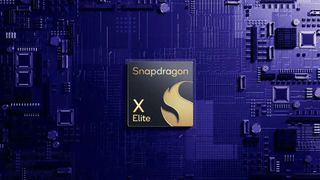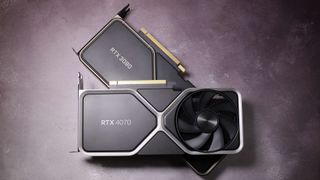Arm is reportedly cancelling Qualcomm's chip licence but it probably won't stop Snapdragon X 'AI' PCs from being made
This legal tussle will almost certainly run and run.

Arm has finally thrown its toys and given 60 days notice that it intends to cancel Qualcomm's licence to produce chips based on Arm technology. So says Bloomberg, which claims to have seen Arm documents detailing the move.
This dispute has been running for a while, but the consequences of such a cancellation, if true, are potentially catastrophic for Qualcomm. The most immediate impact would involve Qualcomm's new Snapdragon X chips for PC laptops. In theory, if the licence was cancelled, Qualcomm would have to stop making the Snapdragon X and the whole Windows-on-Arm AI PC thing, which is only just getting going, would implode.
That's because the licence cancellation is thought to pertain specifically to Qualcomm chips with custom core designs that use the Arm ISA or instruction set architecture. The Snapdragon X is just such a chip design with bespoke CPU cores designed in-house at Qualcomm.
To be really accurate, the Snapdragon X's cores were designed at a startup called Nuvia, which Qualcomm acquired in 2021. But the overarching point is that there are two ways to build an Arm-based chip. One is to licence the Arm ISA and design your own compatible cores, the other is to buy ready-made core designs from Arm.
It's the former that Qualcomm has done with Snapdragon X, so the licence cancellation would apply to custom CPU designs, but not to other Qualcomm chips based on Arm CPU core designs. In other words, the cancellation wouldn't mean that Qualcomm couldn't produce any Arm chips at all, just Arm chips with its own in-house CPU core designs.
In fact, even more specifically than that, the cancellation wouldn't stop Qualcomm from making its custom design chips for phones, for which it reportedly has a separate licence. So, the dispute appears to be narrowly limited to the Snapdragon X for PCs and laptops.
The whole mess can be traced back to the fact that Nuvia originally acquired a licence to produce custom Arm cores aimed at servers and enterprise applications. Arm's beef is that Qualcomm is now using that licence to make chips clearly targeted at laptops and client PCs.
The biggest gaming news, reviews and hardware deals
Keep up to date with the most important stories and the best deals, as picked by the PC Gamer team.
And guess what? A server licence is cheaper than a client licence. At least, that's the prevailing narrative around a dispute that's yet to fully enter the public domain.
So, what will actually happen? The only certainty is that a whole lot of lawyers will get substantially richer on the back of this fracas. But it's probably not actually hugely likely that Qualcomm will be forced to stop making its Snapdragon X chips.

Best CPU for gaming: The top chips from Intel and AMD.
Best gaming motherboard: The right boards.
Best graphics card: Your perfect pixel-pusher awaits.
Best SSD for gaming: Get into the game ahead of the rest.
Instead, it's more a question of whether Qualcomm will have to cough up to keep making Snapdragon X and if so... how much? It's extremely unlikely that Arm really wants Qualcomm to ditch Snapdragon X. It just wants more licensing fees.
Equally, Qualcomm probably has too much invested in all this to simply walk away. So, its aim will surely be to fight to minimise any fees or penalties while it keeps on making Snapdragon X chips. If it has to eventually pay out, so be it.
Indeed, the most likely outcome of all is that this thing will drag out in the courts for years to come, eventually some or other settlement will be announced, by which point we'll all barely remember how and when it all started.
What impact any of this will have on the PC's possible shift from Intel and AMD x86 CPUs to Arm chips is pretty hard to say. Even without this Arm-versus-Qualcomm tussle, the reality of a compelling Arm-powered gaming PC was likely many years away. Given Qualcomm is currently the main protagonist pushing Arm on the PC, this lumbering legal battle hardly seems likely to speed things along.

Jeremy has been writing about technology and PCs since the 90nm Netburst era (Google it!) and enjoys nothing more than a serious dissertation on the finer points of monitor input lag and overshoot followed by a forensic examination of advanced lithography. Or maybe he just likes machines that go “ping!” He also has a thing for tennis and cars.

Nvidia has reportedly killed production of all RTX 40 GPUs apart from the 4050 and 4060 as affordable 50-series GPUs could arrive earlier than expected

AMD's 2025 laptop plans sure do include a lot of refreshed and rebranded APUs, but who cares when you've got Fire Range, Strix Halo, and four RDNA 4 mobile GPUs heading our way next year
Most Popular






